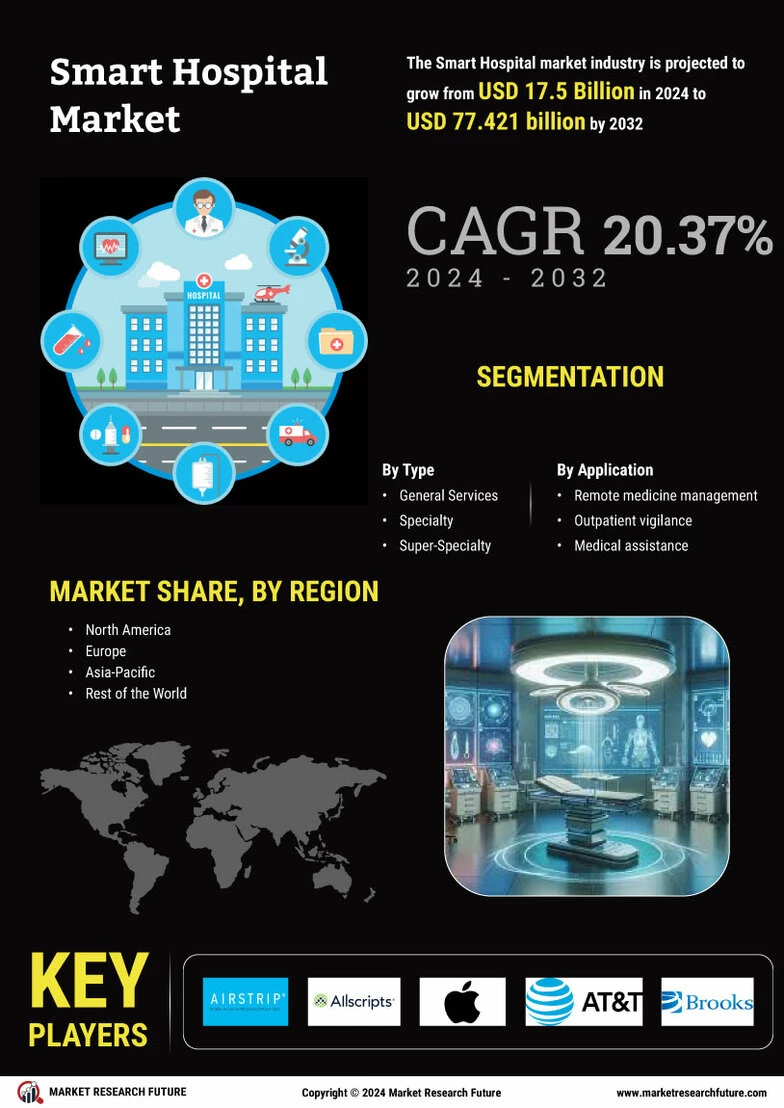Smart Hospital Market Segment: Innovations Across Hospital Divisions
The Smart Hospital Market segment focuses on the adoption of intelligent solutions across different hospital departments such as emergency care, surgery, intensive care, and outpatient services. Each segment benefits from digital technologies tailored to enhance operational efficiency and patient outcomes. For instance, intensive care units leverage IoT devices for real-time monitoring, while surgical departments increasingly use robotics and AI-driven imaging systems for precision procedures. Outpatient services benefit from cloud-based scheduling platforms and telemedicine, ensuring seamless patient engagement and follow-up care.
Get Full Reports:https://www.marketresearchfuture.com/reports/smart-hospital-market-4505
Segment-specific adoption also reflects hospital priorities such as patient safety, clinical efficiency, and resource optimization. Integrating AI analytics across laboratory, pharmacy, and administrative departments allows hospitals to streamline workflows and reduce errors. Additionally, cross-departmental connectivity ensures that patient data flows efficiently, facilitating informed decision-making and improving treatment outcomes. The Smart Hospital Market segment approach underscores the importance of technology customization for each hospital division to maximize operational and clinical benefits.
FAQs:
Q1: Which hospital segments benefit most from smart hospital technologies?
A1: Intensive care units, surgical departments, outpatient services, laboratories, and administrative divisions.
Q2: How do different segments leverage technology?
A2: Through IoT monitoring, AI analytics, robotics-assisted procedures, telemedicine, and cloud-based management.
Q3: Why is segment-specific technology adoption important?
A3: It ensures maximum efficiency, safety, and optimized patient care tailored to each department’s needs.
The Smart Hospital Market segment focuses on the adoption of intelligent solutions across different hospital departments such as emergency care, surgery, intensive care, and outpatient services. Each segment benefits from digital technologies tailored to enhance operational efficiency and patient outcomes. For instance, intensive care units leverage IoT devices for real-time monitoring, while surgical departments increasingly use robotics and AI-driven imaging systems for precision procedures. Outpatient services benefit from cloud-based scheduling platforms and telemedicine, ensuring seamless patient engagement and follow-up care.
Get Full Reports:https://www.marketresearchfuture.com/reports/smart-hospital-market-4505
Segment-specific adoption also reflects hospital priorities such as patient safety, clinical efficiency, and resource optimization. Integrating AI analytics across laboratory, pharmacy, and administrative departments allows hospitals to streamline workflows and reduce errors. Additionally, cross-departmental connectivity ensures that patient data flows efficiently, facilitating informed decision-making and improving treatment outcomes. The Smart Hospital Market segment approach underscores the importance of technology customization for each hospital division to maximize operational and clinical benefits.
FAQs:
Q1: Which hospital segments benefit most from smart hospital technologies?
A1: Intensive care units, surgical departments, outpatient services, laboratories, and administrative divisions.
Q2: How do different segments leverage technology?
A2: Through IoT monitoring, AI analytics, robotics-assisted procedures, telemedicine, and cloud-based management.
Q3: Why is segment-specific technology adoption important?
A3: It ensures maximum efficiency, safety, and optimized patient care tailored to each department’s needs.
Smart Hospital Market Segment: Innovations Across Hospital Divisions
The Smart Hospital Market segment focuses on the adoption of intelligent solutions across different hospital departments such as emergency care, surgery, intensive care, and outpatient services. Each segment benefits from digital technologies tailored to enhance operational efficiency and patient outcomes. For instance, intensive care units leverage IoT devices for real-time monitoring, while surgical departments increasingly use robotics and AI-driven imaging systems for precision procedures. Outpatient services benefit from cloud-based scheduling platforms and telemedicine, ensuring seamless patient engagement and follow-up care.
Get Full Reports:https://www.marketresearchfuture.com/reports/smart-hospital-market-4505
Segment-specific adoption also reflects hospital priorities such as patient safety, clinical efficiency, and resource optimization. Integrating AI analytics across laboratory, pharmacy, and administrative departments allows hospitals to streamline workflows and reduce errors. Additionally, cross-departmental connectivity ensures that patient data flows efficiently, facilitating informed decision-making and improving treatment outcomes. The Smart Hospital Market segment approach underscores the importance of technology customization for each hospital division to maximize operational and clinical benefits.
FAQs:
Q1: Which hospital segments benefit most from smart hospital technologies?
A1: Intensive care units, surgical departments, outpatient services, laboratories, and administrative divisions.
Q2: How do different segments leverage technology?
A2: Through IoT monitoring, AI analytics, robotics-assisted procedures, telemedicine, and cloud-based management.
Q3: Why is segment-specific technology adoption important?
A3: It ensures maximum efficiency, safety, and optimized patient care tailored to each department’s needs.
0 Kommentare
0 Geteilt
4 Ansichten
0 Bewertungen


